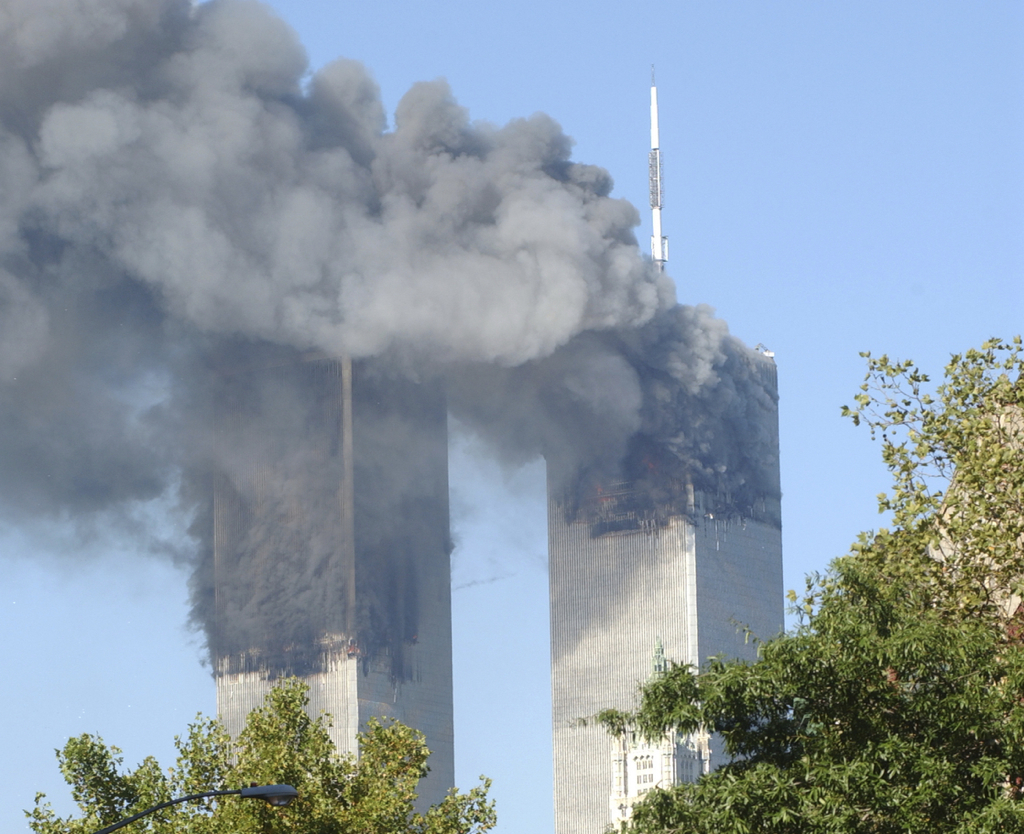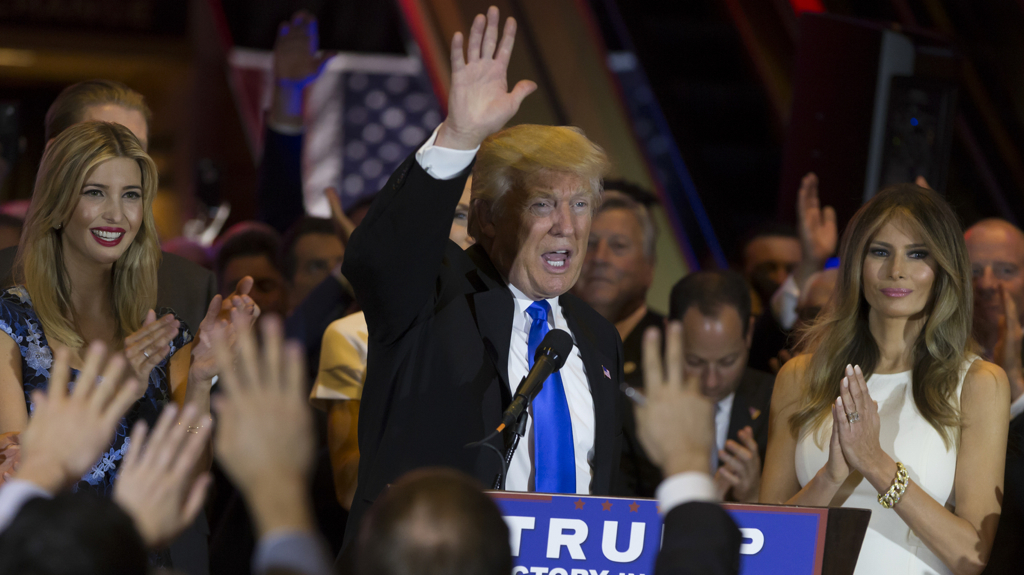While making his usual phone calls to morning news talk shows on Monday, Donald Trump suggested at one point during a segment on Fox News that President Obama may have had some hidden connection to last weekend’s mass shooting at a gay nightclub in Orlando, Florida that left 49 people dead along with the gunman, Omar Mateen.
“Look, we’re led by a man that either is not tough, not smart, or he’s got something else in mind,” Trump told the hosts of Fox & Friends. “And the something else in mind — you know, people can’t believe it. People cannot, they cannot believe that President Obama is acting the way he acts and can’t even mention the words ‘radical Islamic terrorism.’ There’s something going on. It’s inconceivable. There’s something going on.”
Trump’s inference—that the president may have either neglected to prevent the massacre or that he identifies ideologically with Mateen, who in a 911 call minutes before his rampage declared his allegiance to the leader of the Islamic State terror group—is far from the first time he’s peddled a conspiracy theory. He led the movement claiming Obama was not a natural-born US citizen, has repeated the debunked claims that vaccines cause autism, and called climate change an invention of the Chinese government to weaken US productivity.
But as the Republican Party’s presumptive nominee for President, Trump now makes these statements from a higher and louder perch. To try to get a better sense on Trump’s use of conspiratorial rhetoric and whether it’ll help him win, I called Mark Fenster, a law professor at the University of Florida and the author of the 2008 book Conspiracy Theories: Secrecy and Power in American Culture. During our conversation, Fenster explained how Trump phrases his statements to avoid ownership, why other Republicans can’t divorce themselves from him or what he says, and how paranoia and fear-mongering in American politics are as old as the republic itself.
There’s an instinct where you want to be sarcastic toward Trump saying something ridiculous, but there’s something a little more insidious about this.
Let’s not forget one of the things that was bringing Trump to attention in 2012 was the birther stuff, so it’s not totally surprising that he’s saying this. He was getting away with it then and getting attention for it, and he at least thinks it still works for him now. But he’s in a very different place, and I think that’s why it seems especially troubling. It’s one thing for a private nutjob citizen with a lot of money and a reality TV show to say these things, it’s another thing entirely for the presumptive candidate of a major political party to.
Who is he speaking to when he says this stuff?
You can draw a line of the crazy shit Donald Trump says, because he says crazy shit. Not all of it is conspiracy-related. Some of it is just mean-spirited. The interesting question is, is he speaking to different people when he says the conspiracy-theory stuff, or is he just speaking to the audience he has created for himself with the other crazy stuff he says? I think it’s fair to say the people who have remained with him as he has said things that have been out of the political mainstream—“let’s build a wall,” “let’s not let the Muslims in”—and horrible things about anyone who challenges him, whether a reporter or a rival candidate, those people have stayed with him and there’s no reason to think this won’t be the same. It’s not clear to me he’s going to get any larger audience.
What about the role conspiracy theories are playing in our politics as a whole?
If what I just said is right, what does that say about the mainstream of the Republican Party? It’s that part of the mainstream of the Republican Party and that part that is not willing to cut faith with Trump. Everyone is implicated in this. Everyone who has expressed their support for him is now implicated in all the crazy shit he says. What’s the parallel to this on the other side? It was the 9/11 truther movement. And you definitely had a couple members of the House and some intellectuals in far left who were saying things somewhat along these lines. But John Kerry never would have said anything like this, and if he did, you wouldn’t have seen Nancy Pelosi support Kerry if he was suggesting President Bush was somehow involved.
OK, but a year ago people were saying there’s no way the Republican establishment would line up behind Trump, and yet here they are.
I have written and I continue to write that you can’t just lambaste the right for this, you need to lambaste the left for well. But I think with respect to the institutional parties, there is just a basic difference between the Republicans and the Democrats. If I was a Marxist I would be applauding the fact that the contradictions are being worked to death. There’s nothing left other than the bare bones of racism and paranoia.
But beyond the simple Democrat-Republican divide, it seems there is a role conspiracy theories are playing this year that they haven’t in the past. For several months, Trump insisted he saw video of Muslims in New Jersey celebrating 9/11, which was debunked again and again. We heard a lot from the most ardent Bernie Sanders supporters that the primaries were rigged.
I’m going to push back a little on that. Conspiracy theory rhetoric has been a part of American politics since the revolutionary period. It’s part of a general populism that fears the rise of elites. The identity of those elites can change, and sometimes it’s accurate to speak of the outsize role those elites can play. In that regard, Sanders supporters are right. What is a primary other than something that’s tilted in favor of those whom the institutional party favors, and tilted against someone who’s coming from the outside that didn’t even identify as a Democrat for a long period of his career?
There are two distinct things I think are worth thinking about. One is when our mainstream political candidates—and Trump has now become one—explicitly utilize conspiracy rhetoric. Trump is definitely pushing that. But Hillary also famously said there was a “right-wing conspiracy against my husband,” which is both crazy and right. It’s not as though Trump is the only one who says shit like that, though he is more explicit. But let’s separate that from what people actually believe, which I think is a really interesting question that’s very hard to get at. There has long been a strain of American popular opinion that has people believing in conspiracy theories, but not that wholeheartedly and explicitly in the strongest form. The polls at the five- and six-year anniversaries of 9/11 showed a fair bit of interest in the conspiracy theories, but not that much full-throated commitment. There were so many people upset with Bush by 2006 that they were willing to consecrate this guy as a bad guy and may have done bad things. It’s not as clear to me as they were spending all their time on the internet watching Loose Change.

When he started talking about Vince Foster, Trump said, “I don’t bring it up because I don’t know enough to discuss it. I will say there are people who continue to bring it up because they believe it was a murder. I don’t do that because I don’t think it’s fair.” Yet he brought it up himself. Is there a strategy there?
There are different ways of telling a story about a conspiracy theory. In the Kennedy assassination, for people who are really deep into the bullet’s trajectory and the geopolitics and who was on the grassy knoll, things are stated as though they are true theses in litigation. Another mode is to simply say, “Well, I don’t know, but look at this.” Loose Change did a lot of that. It was like, “Well, we don’t know, but it sure looks suspicious.”
So when he poses the Vince Foster thing, is that somehow supposed to be more palatable in the mainstream?
There’s more deniability, for one thing. And it doesn’t invite more questions. If he was to say Vince Foster’s body was moved to Rock Creek Park specifically because of the Park Police and blah blah blah, then there are follow-up questions you could ask. By simply saying “I’m not an expert on this, but I know there are people who believe this,” there’s no way to respond to that because there’s no content to it.
You said there’s always been conspiratorial rhetoric in our political system. But it seems like it hasn’t been this front-and-center in a long time.
I don’t want to erase the hard edges of what went on during the Cold War, but particularly with respect to a major national politician. Joe McCarthy never ran for national office, so it’s not as though he was at the forefront of a presidential election. The John Birch Society was off on the side. Certainly Goldwater supporters flirted with it, and aspects of the Goldwater campaign did, so it’s not as though it wasn’t totally new. What’s different with Trump is that there’s no content to Trump. You knew what Goldwater stood for. Trump just pieces together pieces that are circulating and brings them together in a mishmash.
He tweeted a few months ago after a rally that a protester who jumped on stage had ties to ISIS. (The protester did not.) Chuck Todd questioned him on it a day later, and Trump’s answer was “All I know is what’s on the internet.”
That raises the question of does conspiracy theory define Trump, or does Trump simply use conspiracy theory as part of the emotional argument he makes? I think it’s the latter. I think the conspiracy theory stuff for him, it’s hard to say whether he actually believes it himself. We don’t know where the bullshit ends and Donald Trump begins.



















